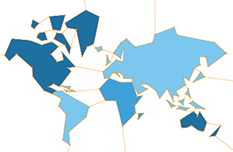Money, Money, Money: A Look at Financial Matters
- Expats in Luxembourg, Switzerland, and several Gulf States benefitted most from move abroad
- Expats in Ukraine, Kazakhstan, and Taiwan relatively well-off despite low absolute income
- Swiss, US Americans, and Australians often earn less in absolute terms after relocating
Methodology
The Expat Insider 2016 survey questionnaire included several questions covering the respondents’ financial situation. In particular, the participants were asked to state by how much their income situation has improved (or worsened) after moving abroad. They also rated whether or not their disposable income is enough to cover expenses. Respondents could also choose to share information on their yearly household income in an optional question.
Is the Grass Always Greener on the Other Side?
In general, when asked if their income from employment abroad is higher than that from a similar career back home, 54% of survey participants respond positively, while 27%, however, state the opposite. Expats located in Luxembourg, Switzerland, and several Gulf States (i.e. Qatar, Oman, and Saudi Arabia) have benefitted the most from their move abroad. More than four in ten expats in each of these countries now have an income that is much higher than what they would earn in a similar position at home.
The annual household income in the countries mentioned above differs, though. In Switzerland, 54% of expats have an income of more than 100,000 USD, while in Qatar, for instance, almost half (48%) have an income of at most 50,000 USD a year. The latter figure might be explained by the respondents’ nationality: the expat population in the Gulf States is dominated by expats from countries where the income situation is a lot worse, and they often take up low-paid jobs in the Gulf region.
However, except for Oman, the cost of living in all these countries is high, with Luxembourg and Switzerland, for example, ranking in the bottom five of the Cost of Living Index. In terms of whether the disposable income is indeed enough to get by in those countries, 50% or more respondents in each country say they have more than what they need.
When it comes to the countries where the household income is more than sufficient to cover daily expenses, expats in Ukraine, Kazakhstan, and Taiwan state their income is a lot more than enough, with over 20% in each country saying so. The purchasing power and cost of living might play a big role here, as Taiwan and Ukraine rank in the top three of the Cost of Living Index as well. The absolute income, though, is relatively low in those two countries, especially in Ukraine. There, more than seven in ten respondents (71%) have a yearly household income of less than 50,000 USD, compared to a global average of 52%.
On the other hand, expats who have moved, among others, to Greece, Israel, or Portugal have significantly worsened their income situation. More than 25% of respondents in these countries make a lot less abroad than a comparable career in their home country would offer. In terms of yearly household income, between seven and nine out of ten expats in Greece (87%) and Portugal (72%) have less than 50,000 USD at their disposal. The dire economic situation there might be an obvious reason for these figures. Furthermore, in Greece, 53% of respondents also say their household income is not enough to live on, while in Israel, 18% even go so far as to say it is not nearly enough. The latter might also be explained by Israel’s 61st place out of 67 in the Cost of Living Index.
The Role of Age, Gender, and Country of Origin
The country of origin is another factor that should be taken into consideration. In particular, Filipinos, Hungarians, and Serbs have improved their income considerably after moving abroad. Half of the expats, more or less, with these nationalities now have a higher income than they would earn in a comparable career back home. However, among them, the percentage of expats with a gross yearly household income of 100,000 USD or more is still below the global average of 20%, with the figure for Serbs being as low as 5%. However, less than three in ten among them say their disposable income is not sufficient to cover their daily expenses.
The nationalities that earn less since relocating abroad include Swiss expats, US Americans, and Australians, with at least 24% of the respondents saying so. Still, more than one-third of both Swiss and Australian expats (35%) live off a household income of at least 100,000 USD annually, while at 24%, the figure for US Americans remains above the global average of 20%. Moreover, 50% or more among the respondents with these nationalities state their disposable income is more than enough to live on.
Demographic factors like age and gender also play a part with regard to income-related data. The age group that has improved their income the most, relatively speaking, consists of expats aged between 26 and 30 years, with 62% of them saying they make more after moving abroad: 27% even estimate that they have a much higher income abroad than they would earn in their country of origin. Nonetheless, in absolute terms, 44% of the expats in this age group only have an income of 25,000 USD a year or less, but 76% say it is enough to cover their daily expenses, or even more than what they need.
Expats aged above 50, though, have improved their income the least. Less than half (47%) have a higher income than they would earn in their home country, while 15% say that their income is indeed a lot lower since they have moved abroad, compared to a global average of 11%. Of course, there might be an obvious explanation for this trend: about one-third of the participants aged 50 or older (34%) choose retiree as their current employment status. Additionally, not even one in five (19%) says their disposable income is not enough.
Male expats, on average, fare better than expat women. Among the men, 58% have improved their income, compared to 50% of women. The percentage of women earning less since their move abroad is also higher than among the male respondents (31% vs. 24%). To add to that, men are also more likely to say their household income is enough to get by (54% vs. 43% among the female survey participants).
Moving On to Bigger and Better Things?
All expat types who moved primarily for their career have improved their income from employment, compared to their home country. Most of the Foreign Assignees (63%) are earning more now, as are the Career Expats (62%). Just like last year, Foreign Recruitees have improved their financial standing the most: 69% now make more money than they would in a similar position back home. Moreover, 32% of those recruited by a foreign company even have a much higher income after relocating internationally for their career.
In terms of absolute household income, Foreign Assignees and Foreign Recruitees are represented well in the top income groups, with 38% and 28%, respectively, having an income of more than 100,000 USD. All in all, at least 54% of those career-related expat types have a disposable income that more than covers their daily needs.
Following one’s heart, however, doesn’t seem to pay off financially: moving for love or to live in their partner’s home country, the Romantics are most likely to earn less than they would back home, with 48% being worse off with regard to income. The Romantics are also strongly represented in the bottom two income groups with an income of 25,000 USD or less, at 38%. Moreover, three in ten say their disposable income is not enough to get by.



